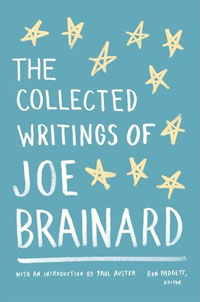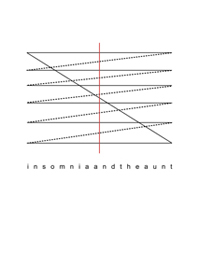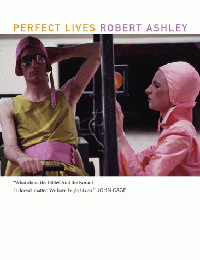The Collected Writings of Joe Brainard
 The Collected Writings of Joe Brainard
The Collected Writings of Joe Brainard
by Joe Brainard
Ed. Ron Padgett
Introduction by Paul Auster
Library of America, March 2012
450 pages / $35 Buy from LOA or Amazon
There are several Joe Brainards you may or may not know. There’s Brainard the internationally-showing collage artist and painter, and there’s also the Joe Brainard who was a downtown NY scene fixture in the poetry world in the ‘60s and ‘70s. The Joe Brainard you probably know, though, is the author of the “cult classic” I Remember, first published in full form in 1975. Written with wit, candor and no pretension to self-importance, the book is a procedural memoir, every single brief entry in the book starting with the title phrase. Rather than offering the drama or grandiosity of an amazing life, Brainard instead provides you with a non-chronological wealth of sly specificity:
I remember after people are gone thinking of things I should have said but didn’t.
I remember how much rock and roll music can hurt: It can be so free and sexy when you are not.
I remember Royla Cochran. She lived in an attic and made long skinny people out of wax. She was married to a poet with only one arm until he died. He died, she said, from a pain in the arm that wasn’t there.
March 30th, 2012 / 12:00 pm
Insomnia and the Aunt
 Insomnia and the Aunt
Insomnia and the Aunt
by Tan Lin
Kenning Editions, 2011
44 pages / $10 Buy from SPD / Amazon
It would be a mistake to state outright any kind of thumbs up or down regarding Insomnia and the Aunt because that would mean there’s something there to judge, and while I’m not suggesting that the book is empty, I’m arguing that the book lives up to its promise billing itself as an “ambient novel.” Both words in that phrase are tricky when dealing with a fifty page novella studded with postcard and TV photos and posed as a very hazy memoir mainly about the unnamed narrator’s relationship to his aunt, though. This titular aunt used to run a motel with her husband in rural Washington for an uncertain span of time across the final third of the 20th century and the first decade of the present one, information delivered to you sometimes in sometimes matter of fact announcement but sometimes in what could be called “ambient” fashion through slowly accruing tossed-off-seeming information. And “ambient” and “novel” normally sit askew from each other, which makes both terms problematic and the reading experience an uncertain one but in the case of the book ambient and novel work together in tandem, both forms present throughout.
February 27th, 2012 / 1:00 pm
Robert Ashley — Perfect Lives
 Perfect Lives
Perfect Lives
by Robert Ashley
Dalkey Archive Press, 2011 (Reprint)
240 pages / $13.95 Buy from Amazon, Dalkey Archive
Premiering on television in 1984 and first published in book form in 1991, Perfect Lives is several texts at once: a comic opera libretto, a novel about a temporary bank heist, a blurb-billed epic poem ranging through small town Midwestern vernacular and Eastern metaphysics, and a kind of textual final resting place for the titular performance in the form of notes, a preface, a synopsis, some notation from the score, and an edited conversation with writer, composer and director Ashley during which he explains the genesis and outcome of the project. (Ashley: “I had this practice: I’d go into a room, close the door, and start singing.”) It’s a good thing that the book is several texts, because while it’s a success as an engaging epic (experimental) poem, it would be a stretch to call it a novel and as a libretto it leaves you having missed out on the three-hour television program that it became with no idea of what it sounded like unless you’re familiar with Ashley’s work and no idea what it looked like except for a still of the production on the cover of the book and a frontispiece featuring Ashley himself playing narrator. Ultimately the loss of context doesn’t make the text suffer because as a set of eight experimental poems obliquely describing a bank heist and an elopement among more metaphysical things it wins at being an engrossing read and at capturing small town Midwestern vernacular and widescreen philosophy in very crisp but entertainingly malformed ways.
February 17th, 2012 / 1:00 am
